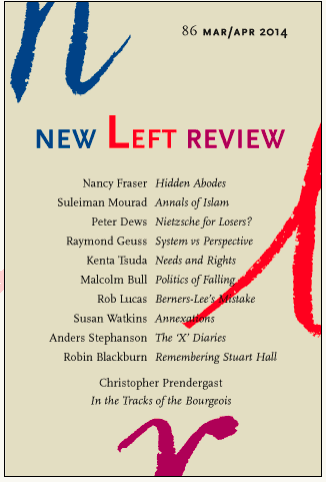User Tools
Sidebar
This is an old revision of the document!
Nancy Fraser, 'Behind Marx's Hidden Abode: For an Expanded Conception of Capitalism'
New Left Review 86 Mar-Apr 2014
My claim is that Marx’s account of capitalist production only makes sense when we start to fill in its background conditions of possibility. So the next question will be: what must exist behind these core features in order for them to be possible? Marx himself broaches a question of this sort near the end of Volume I of Capital in the chapter on so-called ‘primitive’ or original accumulation. Where did capital come from, he asks—how did private property in the means of production come to exist, and how did the producers become separated from them? In the preceding chapters, Marx had laid bare capitalism’s economic logic in abstraction from its background conditions of possibility, which were assumed as simply given. But it turned out that there was a whole back-story about where capital itself comes from—a rather violent story of dispossession and expropriation. Moreover, as David Harvey has stressed, this back-story is not located only in the past, at the ‘origins’ of capitalism. Expropriation is an ongoing, albeit unofficial, mechanism of accumulation, which continues alongside the official mechanism of exploitation—Marx’s ‘front-story’, so to speak….
[E]co-socialist thinkers … are now writing another back-story about capitalism’s free-riding on nature. This story concerns capital’s annexation—its Landnahme — of nature, both as a source of ‘inputs’ to production and as a ‘sink’ to absorb the latter’s waste. Nature here is made into a resource for capital, one whose value is both presupposed and disavowed. Treated as costless in capital’s accounts, it is expropriated without compensation or replenishment and implicitly assumed to be infinite. Thus, nature’s capacity to support life and renew itself constitutes another necessary background condition for commodity production and capital accumulation.
Structurally, capitalism assumes—indeed, inaugurates—a sharp division between a natural realm, conceived as offering a free, unproduced supply of ‘raw material’ that is available for appropriation, and an economic realm, conceived as a sphere of value, produced by and for human beings. Along with this goes the hardening of a pre-existing distinction between the human—seen as spiritual, socio-cultural and historical—and non-human nature, seen as material, objectively given and ahistorical. The sharpening of this distinction, too, rests on the break-up of a previous world, in which the rhythms of social life were in many respects adapted to those of nonhuman nature. Capitalism brutally separated human beings from natural, seasonal rhythms, conscripting them into industrial manufacturing, powered by fossil fuels, and profit-driven agriculture, bulked up by chemical fertilizers. Introducing what Marx called a ‘metabolic rift’, it inaugurated what has now been dubbed the Anthropocene, an entirely new geological era in which human activity has a decisive impact on the Earth’s ecosystems and atmosphere….


